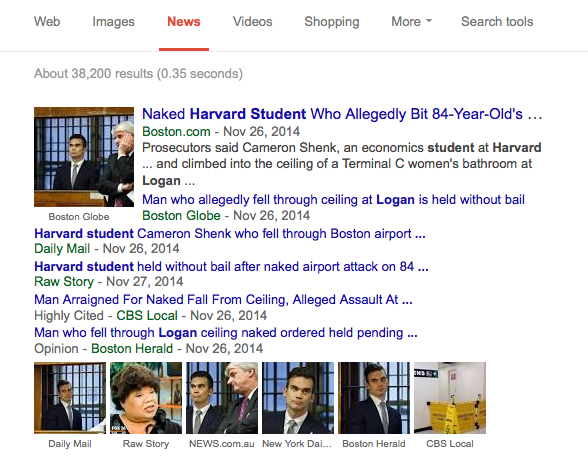Last week there was a flurry of Harvard headlines, after a male student attacked a senior citizen at Logan airport. I won’t get into the details of the story itself, but wanted to talk about the sensationalist coverage and the collateral damage to the Harvard Extension School.
When the story first hit the Internet, it was all about the Harvard connection:

Many of the initial headlines, including those from Boston .com, the Huffington Post, and other national and international outlets, omitted the fact that the student, Cameron Shenk, was an Extension School student. In the absence of such context or knowledge of the Extension School, many people skimming the news would assume it was a Harvard College student, even though Mr. Shenk and his lawyer did nothing to insinuate otherwise. It’s a common assumption, as I’ve cited repeatedly on this blog (see my earlier article about Harvard Extension School resume guidelines).
Predictably, when the Internet commenters and follow-on coverage appeared, the angle turned from tragic crime to criticism of the Extension School and its students. Boston .com’s Eric Levenson claims that Extension School students “just need an interest to learn and some money to spend,” neglecting to mention the wide gap between casual class takers and degree candidates who have to prove they can do coursework at a high level before being admitted.
As I said in the comments section of the Boston .com article, there are a couple of issues at play when it comes to mainstream media stories about the Extension School:
- Clickbait headline writers who want to play up any story involving weird/unstable/criminal behavior and “Harvard”
- A continuing education division that is not well understood (for example, there are casual class takers as well as degree candidates) and often gets defined by strange headlines or fakers.
- A student and alumni population which includes a fair number of people who are apt to play down their Extension School affiliation or deliberately mislead others into thinking they attended Harvard College or one of the highly competitive professional programs, such as the Business School.
I think journalists such as Eric Levenson deserve much of the blame Unfortunately, previous stories about Extension/College imposters, combined with a large number of alumni who claim “Harvard” while hiding “Extension” are adding another negative context to this story.
It’s unfortunate, because the Extension School has some great classes and degree programs, and have helped hundreds of thousands of people further their educational goals. Most of them are good people and are honest about the Extension School affiliation, yet the fakers and bizarre headlines are increasingly defining what it means to be an Extension School student.
I welcome your comments below.


